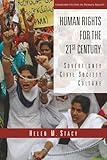Human rights for the 21st century : sovereignty, civil society, culture / Helen M. Stacy.
Material type: TextSeries: Stanford studies in human rightsPublication details: Stanford, CA : Stanford University Press, c2009Description: xi, 260 p. ; 23 cmISBN: 9780804760959 (pbk.); 0804760950 (pbk.); 9780804745390 (hbk.)Subject(s): Sovereignty | Civil society | Culture and law | Human rightsDDC classification: 341.4/8 LOC classification: K3240 | .S717 2009
TextSeries: Stanford studies in human rightsPublication details: Stanford, CA : Stanford University Press, c2009Description: xi, 260 p. ; 23 cmISBN: 9780804760959 (pbk.); 0804760950 (pbk.); 9780804745390 (hbk.)Subject(s): Sovereignty | Civil society | Culture and law | Human rightsDDC classification: 341.4/8 LOC classification: K3240 | .S717 2009| Item type | Current library | Collection | Call number | Copy number | Status | Date due | Barcode |
|---|---|---|---|---|---|---|---|
 Book
Book
|
University of Macedonia Library Βιβλιοστάσιο Α (Stack Room A) | Main Collection | K3240.S717 2009 (Browse shelf (Opens below)) | 1 | Available | 0013132249 |
Includes bibliographical references (p. 233-245) and index.
1. The human rights problem -- 2. Institutionalizing international human rights -- 3. Relational sovereignty and humanitarian intervention -- 4. Reciprocal judging -- 5. Regional human rights courts -- 6. Human rights for the 21st century.
A new moral, ethical, and legal framework is needed for international human rights law. Never in human history has there been such an elaborate international system for human rights, yet from massive disasters, such as the Darfur genocide, to everyday tragedies, such as female genital mutilation, human rights abuses continue at an alarming rate. As the world population increases and global trade brings new wealth as well as new problems, international law can and should respond better to those who live in fear of violence, neglect, or harm. Modern critiques of global human rights fall into three categories: sovereignty, culture, and civil society. These are not new problems, but have long been debated as part of the legal philosophical tradition. Taking lessons from tradition and recasting them in contemporary light, Helen Stacy proposes new approaches to fill the gaps in current approaches: relational sovereignty, reciprocal adjudication, and regional human rights. She forcefully argues that law and courts must play a vital role in forging a better human rights vision in the future.





There are no comments on this title.